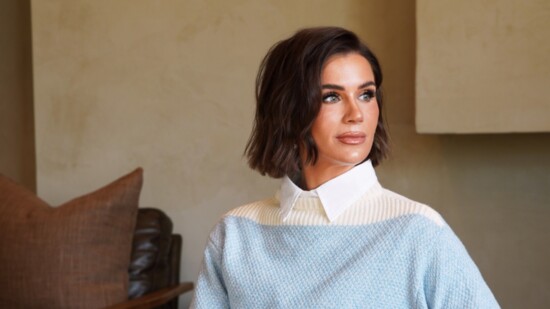When Caitlin Estell moved from Los Angeles to Nashville during the pandemic to be with her then-boyfriend, now-husband, radio and television personality Bobby Bones, she says she didn’t expect the major life shift that occurred.
“I went from having a normal life, with only my friends following me on socials, to moving to a city where my husband is very public. I don’t think you really know if you like something until you experience it,” she says, speaking of the sudden exposure to his fanbase. “I wasn’t used to feedback about myself from anyone who didn’t know me, and I hadn’t yet built up the muscles to turn a blind eye to those opinions."
Caitlin says she and her husband and are very opposite in that way. "He’s very much public and would prefer to post what he’s having for breakfast every day on the internet,” she says. “We’re different, not worse, not better. The pandemic, mixed with lifestyle adjustments, caused me to have some anxiety, even more so than I was having in regular life.”
After moving from a city and friends she loved to a town where she knew no one but Bobby, Caitlin says she wondered what kind of life she’d have here, especially when the world was shut down. “Then I had to figure out how to have a life when the world wasn’t shut down.”
Now, she loves Nashville and has a very supportive friend group, but finding the answer took two years and a lot of self-discovery.
“I realized I needed to figure out what I actually think about myself, so I’m not cosigning things, whether positive or negative, and letting that shape who I am as a human. I got caught in that for a bit, mostly the negativity, but even the positive things. People might comment that you always have cute shoes, and you think, ‘Oh no, people think I always have cute shoes! Now I always have to have cute shoes! All the time!’”
Caitlin discovered that looking for her identity in what other people either liked about her or didn’t was something she was no longer willing to do.
Having been in therapy after a traumatic experience as a child, Caitlin says she knew help from a professional would allow her to take positive steps to adjust to her new life and manage her anxiety.
“When things got hard, I knew I needed to talk some of this out. I thought, ‘I can’t take this home to Bobby every night.’ He’d lived this life for so long. A lot of the things that would really rock me were so normal to him that he couldn’t fully comprehend why I’d put so much stock in other people’s opinions. But I’ve never had strangers say things about me before. This world is wild, and I needed help.
“I think another reason I needed therapy was about losing my identity. Most of the time, my husband’s job makes him the main character, and I needed to figure out, ‘Who am I beyond a supporting character?’ I was always introduced as Bobby’s something, his girlfriend or fiancée or wife.”
Caitlin felt a deep desire to figure out who she wanted to be and how to “make this life familiar, to find something that I enjoy and how not to lose myself in the shadow of another person, even though that shadow is beautiful.”
“I’m at a place where I like myself. I’m at peace with who I am right now," she says. "I’m not sharing my experience over the last few years to get love. At the end of the day, regardless of what anyone thinks of my mental health/self-love journey, I will still love myself.”
As for those walking through life with her, Caitlin says, “I have such a great support system. I had a conversation with a friend about mental health the other day. He’s on his own journey, and we can really get in the weeds about the subject, and he was proud I was doing this interview. It might seem trivial, but it’s such a step for me. I used to hide from everyone. It’s not that I care what strangers say to each other about me; it’s the thought of someone I love seeing what they’re saying and having a negative opinion.”
Assured that her loved ones could read anything and still love her, she says, “It’s that safety of having people who love and know you. It allows you to be yourself. If you don’t know where you hold your value, or if it is constantly tied to the opinions of others, it’s a never-ending game. You’re going to be constantly looking for that affirmation. You have no control over your value at that point.”
"Who am I beyond a supporting character?"
"I’m not sharing my experience over the last few years to get love."






